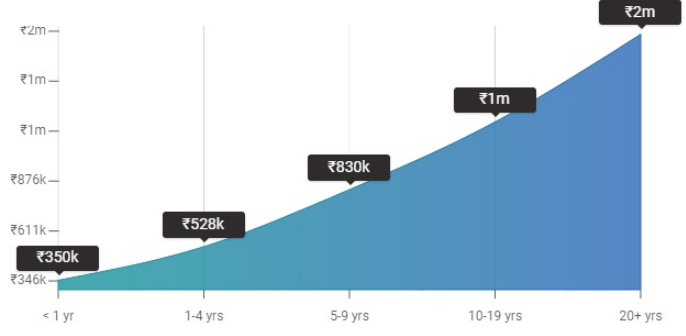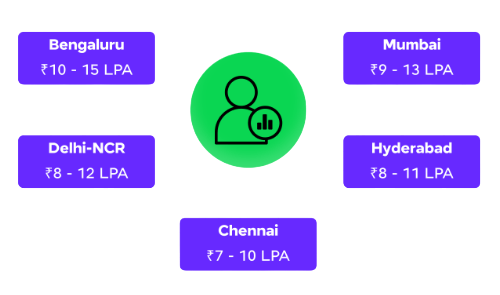
- Introduction to Salary Trends
- Freshers vs Experienced Salaries
- Top Cities and Regional Breakdown
- Industry-Wise Salary Comparison
- Educational Background and Certifications
- Job Roles Influencing Salaries
- Skills That Attract Higher Pay
- Freelancing and Contract Roles
Introduction to Salary Trends
Salary trends in the job market reflect evolving demands, skill sets, economic conditions, and geographic influences. For professionals in analytics, technology, and business-related fields, understanding salary patterns is essential for making informed career decisions. The salary landscape changes annually, influenced by innovation, remote work models, and global competitiveness. This article explores salary trends across experience levels, industries, regions, and skills. In India, the role of a Business Analyst (BA) has become increasingly vital across industries, bridging the gap between data-driven insights and strategic decision-making. As organizations continue to embrace digital transformation, the demand for skilled business analysts has surged, directly impacting salary trends and increasing the need for Business Analyst Training. Entry-level business analysts with 0–2 years of experience can expect to earn between ₹4.5–₹7 LPA, depending on their educational background, technical proficiency, and the industry. Graduates from reputed institutions or those with certifications like CBAP or IIBA often command higher packages. For mid-level professionals with 3–6 years of experience, salaries typically range from ₹8–₹14 LPA. These professionals are expected to manage cross-functional teams, translate business requirements into technical deliverables, and contribute to strategic planning. Domain expertise in finance, healthcare, or e-commerce further boosts earning potential. Senior business analysts with over 7 years of experience can earn ₹15–₹25 LPA or more, especially in multinational companies or consulting firms. Leadership roles, stakeholder management, and advanced analytics skills like SQL, Python, or Power BI contribute significantly to these higher salaries. Location also plays a crucial role: metros like Bangalore, Mumbai, and Hyderabad offer higher compensation due to the concentration of IT and consulting firms. Remote work flexibility has also allowed BAs in tier-2 cities to negotiate competitive packages. As India’s economy continues to digitize, business analysts remain central to strategic growth, and their salary outlook reflects this growing significance.
Interested in Obtaining Your Business Analyst Certificate? View The Business Analyst Training Offered By ACTE Right Now!
Freshers vs Experienced Salaries
Salary trends in technology and analytics roles vary significantly based on experience, skill set, and geography. Entry-level professionals, or freshers, typically earn lower salaries as they begin their careers with foundational knowledge and limited hands-on experience. In India, freshers in roles such as business analysis, data analytics, or software development can expect to earn between INR 3 to 6 LPA. Factors such as the employer’s brand, the candidate’s educational background, and the job location play a crucial role in determining initial salary offers, which can also be influenced by concepts like What is Cost of Quality COQ. Metro cities like Bangalore, Mumbai, and Hyderabad often offer higher entry-level salaries due to increased demand and a higher cost of living. As professionals gain experience typically in the 5 to 10-year range salaries rise significantly. In India, professionals with this level of experience can command INR 15 to 30 LPA or more, especially if they possess specialized skills in areas like artificial intelligence, machine learning, cloud computing, or advanced business intelligence tools.

Certifications such as PMP, CBAP, AWS, or Azure further enhance earning potential and open doors to leadership roles. In contrast, salary structures in the United States are substantially higher. Freshers in technology roles typically start at USD 60,000 to 85,000 annually. With 5 to 10 years of experience, professionals can earn between USD 120,000 to 160,000 or more. Career growth and salary progression are heavily influenced by technical expertise, domain specialization, soft skills, and the ability to lead teams and projects effectively.
Top Cities and Regional Breakdown
- Geography Influences Salary Levels: Location significantly impacts salary structures, with major cities often offering higher pay due to industry concentration and economic development.
- Top Paying Cities in India: Bangalore, Hyderabad, Mumbai, Pune, and Gurgaon are the highest salary hubs in India, driven by a strong presence of IT companies and multinational corporations (MNCs).
- Bangalore as Tech Capital: Bangalore leads as India’s tech capital, with salaries typically 10–20% higher than in other regions, reflecting its status as a major technology and innovation center.
- High Salary Cities in the US: In the United States, the highest-paying cities include Silicon Valley (San Francisco Bay Area), New York City, Seattle, and Austin, each hosting numerous top-tier technology companies, illustrating concepts related to What Are Market Structures.
- Cost of Living Adjustments: Salaries in these US cities are often adjusted to account for the high cost of living, ensuring compensation remains competitive and attractive.
- Impact of Remote Work Trends: The rise of remote work has started to bridge geographical salary differences, as companies increasingly offer competitive packages regardless of employee location.
- Attracting Top Talent: To attract skilled professionals in a competitive market, many companies now focus on offering salary packages based on talent and skills rather than just geographic location, reducing the traditional pay gap between regions.
- IT and Software Services: This sector offers some of the highest salaries, especially for roles in software development, data science, and DevOps. These positions are critical for building and maintaining digital infrastructure, driving innovation, and ensuring system reliability.
- Banking and Finance: Careers in banking and finance are known for lucrative pay packages, particularly in business analysis, financial modeling, and risk assessment. These roles are vital for strategic decision-making and managing financial risks.
- E-commerce and Retail: The growing importance of online sales has increased demand for digital marketing analysts and UX/UI experts, highlighting the value of Business Analyst Training. These professionals help improve customer engagement and optimize user experiences, directly influencing revenue growth.
- Healthcare and Pharma: There is a rising need for data analytics professionals in healthcare and pharmaceutical sectors, focusing on improving patient care and advancing research and development. These roles support better outcomes and innovation in treatments.
- Telecommunications and Manufacturing: Salaries in telecommunications and manufacturing tend to be moderate compared to tech and finance sectors. The emphasis here is often on roles centered around process improvement and operational efficiency.
- Top Paying Industries: Overall, finance, healthcare, and technology industries tend to offer the best pay scales. Candidates with specialized, niche skills in these sectors are especially well-compensated due to the high demand for expertise.
- Skills and Industry Demand: The combination of industry growth and niche skill sets drives salary levels. Professionals who develop expertise in high-demand areas like data science, financial analysis, and digital marketing are positioned for better pay and career growth.
- Salary Variations by Role: Within the same industry, different job roles can have significantly varied salary ranges based on responsibility, experience, and skill requirements.
- Business Analyst Salaries: In India, Business Analysts earn between INR 6 to 15 lakh per annum (LPA), while in the US, their salaries range from USD 75,000 to 110,000. This role focuses on analyzing business needs and supporting decision-making.
- Senior Business Analyst Pay: Senior Business Analysts command higher pay due to greater expertise and responsibilities, with salaries of INR 15 to 25 LPA in India and USD 110,000 to 135,000 in the US, often supported by skills gained in Business Analytics With R Programming Languages.
- Data Analyst Compensation: Data Analysts typically earn INR 5 to 12 LPA in India and USD 70,000 to 100,000 in the US, reflecting the demand for data interpretation and reporting skills.
- Product Manager Salary: Product Managers are among the higher-paid roles, earning INR 20 to 35 LPA in India and USD 120,000 to 160,000 in the US, due to their responsibility for product strategy and lifecycle management.
- Project Manager Pay Scale: Project Managers earn between INR 15 to 30 LPA in India and USD 90,000 to 140,000 in the US, overseeing project delivery and cross-functional coordination.
- Leadership and Strategic Roles: Roles involving leadership, client engagement, and strategic responsibilities generally receive better compensation packages. This reflects the added value and impact these positions have within organizations.
To Earn Your Business Analyst Certification, Gain Insights From Leading Data Science Experts And Advance Your Career With ACTE’s Business Analyst Training Today!
Industry-Wise Salary Comparison

Educational Background and Certifications
Educational qualifications play a critical role in shaping salary expectations in technology, analytics, and business-related careers. A graduate degree in fields such as computer science, engineering, or business administration typically sets the foundational benchmark for entry-level roles. Employers often consider these degrees as indicators of a candidate’s technical proficiency, problem-solving abilities, and readiness to adapt to corporate environments. Postgraduate qualifications like an MBA, MTech, or specialized master’s degrees in data science or information systems can significantly enhance one’s earning potential, often leading to a 20–40% salary increase over those with only an undergraduate degree. In today’s competitive job market, certifications serve as powerful differentiators. They demonstrate not only technical expertise but also a commitment to continuous learning and professional growth, which helps in identifying Where Are The 8 Hidden Wastes. For business analysts, credentials such as the Certified Business Analysis Professional (CBAP) and Certified Scrum Master (CSM) validate key competencies in business process improvement and agile methodologies. Data professionals benefit from certifications like the Google Data Analytics Certificate or Microsoft Certified: Data Analyst Associate, which emphasize hands-on analytics skills. Cloud certifications such as AWS Certified Solutions Architect and Microsoft Azure Fundamentals are highly valued, especially as companies increasingly migrate operations to cloud platforms. Professionals who hold multiple certifications across domains particularly in cloud computing, data science, and project management are often able to negotiate premium salaries due to their cross-functional expertise and versatility. Ultimately, the combination of formal education and targeted certifications significantly improves job prospects, opens doors to leadership roles, and aligns with higher compensation in the evolving tech and business landscape.
Gain Your Master’s Certification in Business Analyst by Enrolling in Our Business Analyst Master Program Training Course.
Job Roles Influencing Salaries
Skills That Attract Higher Pay
In today’s competitive job market, possessing in-demand skills significantly elevates earning potential and career advancement opportunities. Employers increasingly value professionals who demonstrate a strong combination of technical expertise, business acumen, and soft skills. Among the most sought-after technical skills are SQL, Python, R, Tableau, Power BI, cloud computing, big data technologies, and artificial intelligence. These tools and platforms are essential for data analysis, automation, and scalable decision-making processes. Professionals proficient in these technologies are highly valued across industries, from finance and healthcare to e-commerce and consulting. Alongside technical abilities, business skills play a critical role in determining salary and career trajectory. Competencies such as financial analysis, requirement elicitation, stakeholder management, and familiarity with Agile or Scrum methodologies are essential for translating data insights into actionable business strategies, highlighting the differences in Data Mining Vs Statistics. These skills help bridge the gap between technical teams and business leadership, making such professionals indispensable in cross-functional environments. Equally important are soft skills, which often influence hiring and promotion decisions. Effective communication, problem-solving, adaptability, and leadership capabilities enable professionals to manage teams, handle client interactions, and drive innovation. These attributes contribute to long-term success, particularly in dynamic and fast-paced work environments. Professionals who master a combination of technical, business, and soft skills are well-positioned for higher compensation and faster promotions. Their ability to contribute across multiple dimensions of a project or organization makes them valuable assets, often leading to greater recognition, leadership opportunities, and salary growth. As the job landscape continues to evolve, staying current with in-demand skills remains a key factor in long-term career success.
Preparing for a Business Analyst Job Interview? Check Out Our Blog on Business Analyst Interview Questions and Answers
Freelancing and Contract Roles
Freelancing and consulting have emerged as highly lucrative alternatives to traditional salaried roles, especially in fields like data analytics, business strategy, and technology. Independent professionals often have the flexibility to choose their projects, set their own rates, and work with clients across the globe. For experienced individuals with specialized expertise, freelancing can offer significantly higher earning potential compared to full-time employment. In India, seasoned freelancers in areas such as data analytics, business intelligence, and strategic consulting typically charge between INR 1000 to 5000 per hour. These rates vary depending on the complexity of the project, the freelancer’s experience, and the client’s budget. In the United States, freelance consultants and data professionals often charge between USD 50 to 200 per hour, with top-tier experts commanding even more, underscoring the benefits of Business Analyst Training. This model allows high-performing freelancers to earn substantially more than their salaried peers, especially when working on large-scale or long-term projects. Global freelancing platforms like Upwork, Toptal, and Fiverr have made it easier for professionals to connect with international clients and earn in foreign currencies. These platforms offer exposure to diverse industries and the opportunity to build a strong portfolio. However, success in freelancing depends not only on technical and business skills but also on the ability to manage clients, negotiate contracts, and build a personal brand. Strong communication, reliability, and a clear value proposition are essential for sustained success. For professionals who are self-motivated and entrepreneurial, freelancing provides a rewarding career path with greater autonomy, income potential, and global reach.




